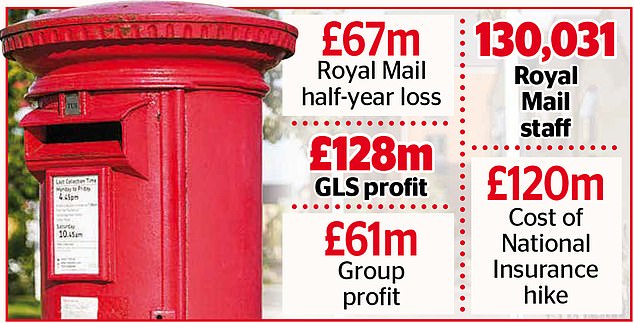Table of Contents
Royal Mail has warned of further price rises as a result of the Chancellor’s raid on National Insurance.
Martin Seidenberg, director of parent company International Distribution Services (IDS), said it would need to increase prices to offset a £120m hit from the measures revealed in the Budget last month.
The postal service, which has been around for 508 years, has already increased the cost of a first-class stamp three times a year, from £1.10 to £1.65.
Seidenberg said the increase in National Insurance (actually a tax on employment) would hit hard because it employs around 130,000 people.
Increases: Royal Mail owner IDS said the delivery group would need to increase prices to offset a £120m hit to the business due to the measures revealed in the Budget last month.
“The cost environment is getting worse just at the time we need to invest,” he said. “As a major employer, changes to National Insurance will disproportionately affect our business relative to competitors.”
He added that the company was considering “all possible measures”, including greater automation in sorting offices, and refused to rule out job cuts.
“It’s too early to say what we will do,” he said. ‘It will be about pricing, cost efficiency and other ways we can move forward. “Anything that could affect our people would be a last resort.”
This prompted a rebuke from the Communication Workers Union (CWU), which represents around 100,000 Royal Mail employees.
The union said IDS was trying to “present Royal Mail as a basket case” and “create a false narrative” as an excuse to reduce staff numbers.
The clash comes at a critical time for Royal Mail, which faces an uncertain future after a takeover this year by Czech tycoon Daniel Kretinsky. The energy magnate, nicknamed the “Czech Sphinx”, controls almost 28 percent of IDS through his Vesa Equity vehicle.
If the Government approves a £3.6bn bid, Royal Mail will come under foreign ownership for the first time since it was established by Henry VIII in 1516.
Royal Mail reported a loss of £67m for the six months to September, a substantial improvement on the loss of £319m in the same period last year.
IDS, which also owns the profitable GLS international delivery network, reported an overall half-year profit of £61m, against a loss of £169m in 2023.
Royal Mail was brought to its knees during a series of strikes in 2022 and 2023, which caused severe disruption to deliveries and left the company haemorrhaging money.
While he expected Royal Mail to make a profit for the full year, Seidenberg said price increases across the board, including parcels and commercial mail, were being considered to offset the massive tax rise announced in the Budget.
He added that changes to Royal Mail’s universal service obligation were now “even more urgent”. The legal obligation requires Royal Mail to deliver letters throughout the UK six days a week at a single price.
But the company has pushed for reform, arguing that a sharp decline in letters sent means the service is no longer fit for purpose and is costing it millions of pounds a day.
Talk of price rises also threatens to intensify criticism of Royal Mail’s already high shipping costs, with reports this week showing it would be cheaper to fly to Europe and send Christmas cards to the UK from other countries than by domestic first class mail.
DIY INVESTMENT PLATFORMS

AJ Bell

AJ Bell
Easy investing and ready-to-use portfolios

Hargreaves Lansdown

Hargreaves Lansdown
Free Fund Trading and Investment Ideas

interactive inverter

interactive inverter
Fixed fee investing from £4.99 per month

sax

sax
Get £200 back in trading fees

Trade 212

Trade 212
Free trading and no account commission
Affiliate links: If you purchase a This is Money product you may earn a commission. These offers are chosen by our editorial team as we think they are worth highlighting. This does not affect our editorial independence.

